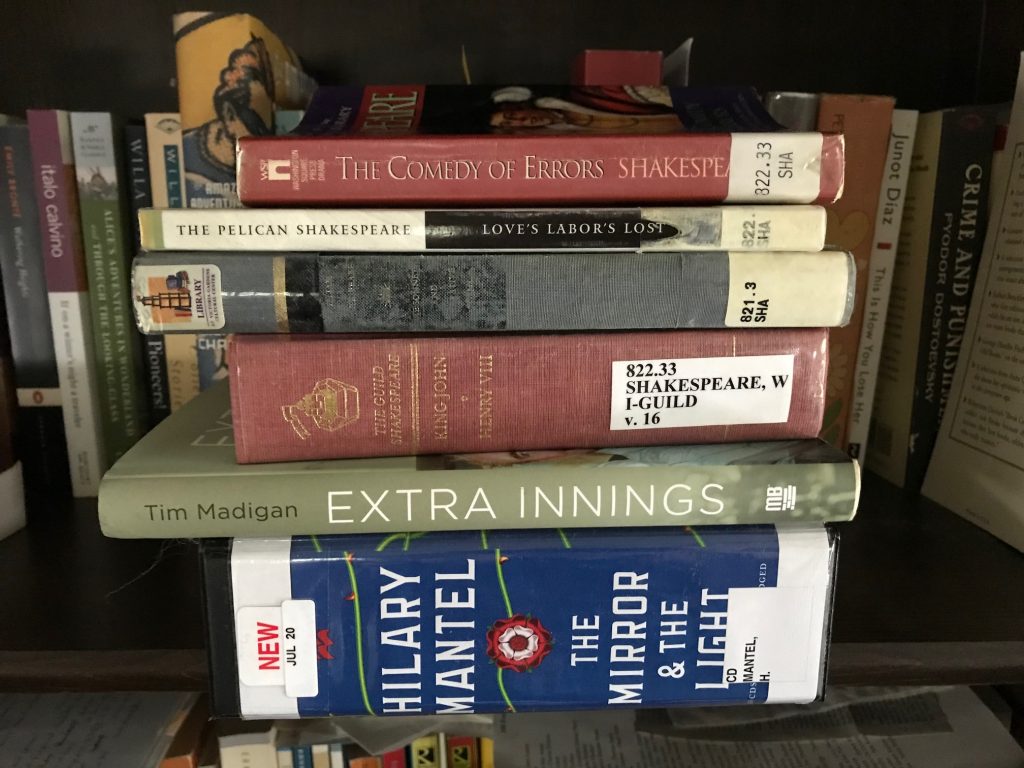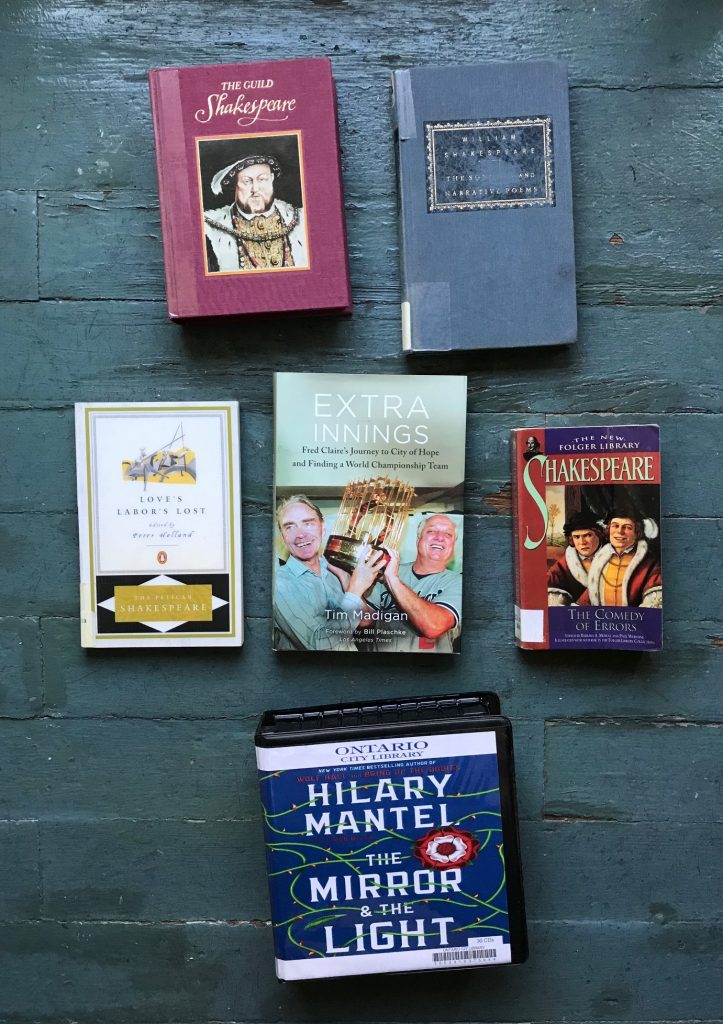Books acquired: “Rod Serling’s Night Gallery,” Scott Skelton and Jim Benson; “Liner Notes,” Loudon Wainwright III
Books read: “Extra Innings: Fred Claire’s Journey to City of Hope and Finding a World Championship Team,” Tim Madigan; “Sonnets and Narrative Poems,” “The Comedy of Errors,” “Love’s Labor’s Lost,” “Henry VIII,” William Shakespeare; “The Mirror & the Light,” Hilary Mantel
Happy September! (I hope!) My reading for August was a bit more high-toned than usual. As I slowly make my way through Shakespeare’s oeuvre, I’ve gone from reading one play per year to two, and then last year to three, plus a book about him. This year I read three plays and all his poems. I now think of this as my annual Shakespeare Month.
But I also read one related book, a novel set in 16th century England, and one totally unrelated book, a nonfiction book about baseball and a life-threatening illness. After interviewing Fred Claire, he had his publisher send me the brand-new book about him, and I saw no reason not to read it immediately. It wasn’t Shakespeare, but it was all right.
“Extra Innings” (2020): Former Dodger executive Claire’s series of treatments for cancer and its complications, and his near-miraculous recovery at City of Hope medical center (he was the only patient to survive a clinical trial), is the heart of this story, but there’s some Dodgers history in here too for the fans, particularly about the 1988 World Series-winning team that Claire built. The doctors, however, are the “world championship team” of the subtitle. An honest, sobering look at cancer’s toll.
“The Sonnets and Narrative Poems” (1593-1609): The sonnets are endlessly inventive, if sometimes obscure, especially to modern ears. The narrative poems are very different from each other. “The Rape of Lucrece” and “The Phoenix and Turtle” are the standouts, the others landing on the formal, dull side. Shakespeare’s plays are the rightful focus of our interest, but his poems are a legacy in themselves.
“The Comedy of Errors” (1594): Silly, highly enjoyable farce about mistaken identity and human doubles. This is one of Shakespeare’s earliest plays, and — if I may be so bold — the lad seems to have a bright future ahead of him. (Or maybe not; see next summary.)
“Love’s Labor’s Lost” (1594-5): This one is so firmly rooted in Elizabethan times that some of the dialogue is baffling even to experts, so what are the rest of us to do? Women do get the upper hand, which is commendable, but most of what I got out of this play was from the introduction. Of course it’s Shakespeare and has lasted more than four centuries and all that. But this was a chore to read.
“Henry VIII” (1612-13): Shakespeare’s last history play, and perhaps not entirely his at that, this is more a collection of scenes than a story and more an ensemble piece than a focused study of Henry, or any of the other players for that matter. Katherine and Wolsey get off some good speeches, though, adding interest to one of Shakespeare’s more pedestrian outings.
“The Mirror & the Light” (2020): I listened to this on audiobook, just like the first two in the Cromwell trilogy. Er, a bit long: 30 discs!?! The wrap-up is of a piece with the first two books: penetrating, detailed, fascinating, moving and often bitingly funny. But it does seem padded. Ben Miles is the best of the narrators, capturing Cromwell’s working-class tones. Cromwell was talented enough to rise to Henry VIII’s chief adviser, but he was a blacksmith’s son.
A little background: Since spring I’d been watching Patrick Stewart’s sonnet a day videos on Twitter, reading the sonnet twice and then following along as he read it; he took a break and I started following another account, the Jermyn Street Theatre, from where Stewart left off; then Stewart took up again and I was following both. JST wrapped up a couple of weeks ago; Stewart has about a month to go. Figuring I might as well knock off all of Shakespeare’s verse, I checked out a book of his sonnets plus his handful of poems and read those. So, his non-stage writing is now handled.
Among the plays, I chose “Comedy” and “Love’s” because I had more comedies unread than tragedies, histories or romances, and “Henry” because it tied in with Mantel’s work. Three plays was about right for Shakespeare Month; one of the books has “King John” but I was short on time and kind of Bard-ed out.
Now I have 15 Shakespeare plays left (out of 38) to read. Progress!
Because my 1980s college-textbook “Riverside Shakespeare” omnibus is unwieldy to lug around, I relied on local libraries (Ontario, Pomona, Rancho Cucamonga) for portable editions, and got “Mirror” from the Ontario library. That was a $60 value over buying all 30 discs — thanks, Ontario! And as stated, “Extra Innings” was a freebie.
Now it’s your turn. We’re eight months through this most unusual year. What did you read in August, and how is your reading year going? I’m at 33 books, slightly ahead of the usual pace, and with some ambitious books among my total. But what else is there to do in 2020 but read (and follow baseball)?
Next month: The country of women.


